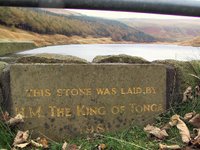A good song
 Manchester Rambler
Manchester Ramblerby
Ewan MacColl
I've been over Snowdon,
I've slept upon Crowdon
I've camped by the Waynestones as well
I've sunbathed on Kinder, been burned to a cinder
And many more things I can tell
My rucksack has oft been me pillow
The heather has oft been me bed
And sooner than part from the mountains
I think I would rather be dead
Ch: I'm a rambler, I'm a rambler from Manchester way
I get all me pleasure the hard moorland way
I may be a wageslave on Monday
But I am a free man on Sunday
The day was just ending and I was descending
Down Grinesbrook just by Upper Tor
When a voice cried "Hey you" in the way keepers do
He'd the worst face that ever I saw
The things that he said were unpleasant
In the teeth of his fury I said"
Sooner than part from the mountainsI think I would rather be dead"
He called me a louse and said "Think of the grouse"
Well I thought, but I still couldn't see
Why all Kinder Scout and the moors roundabout
Couldn't take both the poor grouse and me
He said "All this land is my master's."
At that I stood shaking my head
No man has the right to own mountains
Any more than the deep ocean bed
I once loved a maid, a spot welder by trade
She was fair as the Rowan in bloom
And the bloom of her eye watched the blue moorland sky
I wooed her from April to June
On the day that we should have been married
I went for a ramble instead
For sooner than part from the mountains
I think I would rather be dead
So I'll walk where I will over mountain and hill
And I'll lie where the bracken is deep
I belong to the mountains, the clear running fountains
Where the grey rocks lie ragged and steep
I've seen the white hare in the gullys
And the curlew fly high overhead
And sooner than part from the mountains
I think I would rather be dead. -----------------------------------------------------------------
Recorded by Ewan MacColl on "Black And White" (1983)copyright Ewan MacColl Ltd.
"One of the earliest of MacColl's songs, written in the early 1930s,this is widely believed to be a traditional folksong. You can stillhear walkers sing it in the pubs on rambles. It was written in 1932for the mass trespass over Kinder Scout, Derbyshire, when 3000unarmed walkers and hikers faced gamekeepers with clubs and policewith truncheons. Many of the ramblers went to prison for their action.A plaque in the Edale Tourist Information office celebrates both thetrespass and this song"
I’ve sung this song many times in public, in alehouses in the north of England, as well as a few elsewhere, and I always get people to join in; it is still very well known, even by people who do not come from my neck of the woods, or have ever set foot on Kinder Scout. The song retains its appeal; it is a rousing song, and its theme is a glorious one - 'Britons never, never, never, shall be slaves'
Robert L. Fielding

0 Comments:
Post a Comment
Visit My Website<< Home